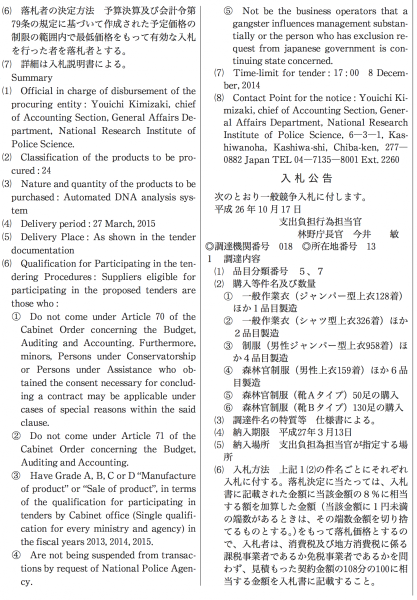For foreign suppliers with no Japanese language capabilities, the English language summary of the tender notice is the first source of information to decide whether there is a business case to tender for a contract. Below explains in more detail what kind of information is provided, and perhaps more important, the information that is not provided in the English summary.

English summary explanation
5 Summary
(1) Official in charge of disbursement of the procuring entity: |
The official in charge of procurement at the procuring entity. Usually the functional head of the contracting or purchasing department. |
(2) Classification of the services to be procured: |
This is the WTO classification of goods and services. A list is available here. |
(3) Nature and quantity of the services to be purchased: |
This describes what the procuring entity wants to purchase and the quantity it wants to purchase, often expressed as sets. This information is the first and only lead in English to decide whether to pursue a tender. |
(4) Fulfillment period: |
Deadline when the actual product or service needs to be delivered. |
(5) Fulfillment place: |
Location where the actual product or service needs to be delivered. |
(6) Qualification for participating in the tendering procedures: |
This section lists the various pre-conditions in order to be allowed to participate in the tendering procedures, they usually include the following clauses: - Is not involved in bankruptcy or insolvency procedures. (Articles 70 and 71 of the Cabinet Order concerning the Budget, Auditing and Accounting) - In possession of the proper supplier qualification and classification - Is not suspended from bidding by the procuring entity - Can prove to have actually performed the service concerned or the service - Has acquired the electric certificate in case of using the Electric Bidding system |
(7) Time-limit for tender: |
Deadline for submission of the tender documentation |
(8) Contact point for the notice: |
Prospective bidders can obtain tender documentation and make inquiries with the person specified here. This is usually only possible by telephone. |
Information usually omitted from the English summaries
Competitors with Japanese language capabilities have access to more information in the tender notices.
The Japanese language calls for tender usually include the following information:
- Tendering method, such as whether the Overall Greatest Value (OGV) method will be used and the number of rounds of bidding.
- To include VAT (8%) in the bidding price
- Whether the bidding will take place using the electronic bidding system
- Additional conditions for participation (Such as documentation proving that the supplier can provide quick and sufficient after-service, and provision of technical documentation)
- Address where to submit the documentation
- Method to obtain tender documentation
- Location where the tenders are opened
- Stipulations regarding language and currency (Almost always Japanese and JPY)
- Whether tender deposits are required (In most cases not required)
- Stipulations regarding winning tenderers (That they must meet the technical requirements
- Whether a contract needs to be drawn up (Document is usually part of the tender documentation)
- Whether negotiations regarding the procedure is possible (Usually not)
- In case of construction tenders:
- Outline of the work that needs to be performed
- Expected price
- The evaluation method used (such as as Value Engineering)
- Keishin score that is required









